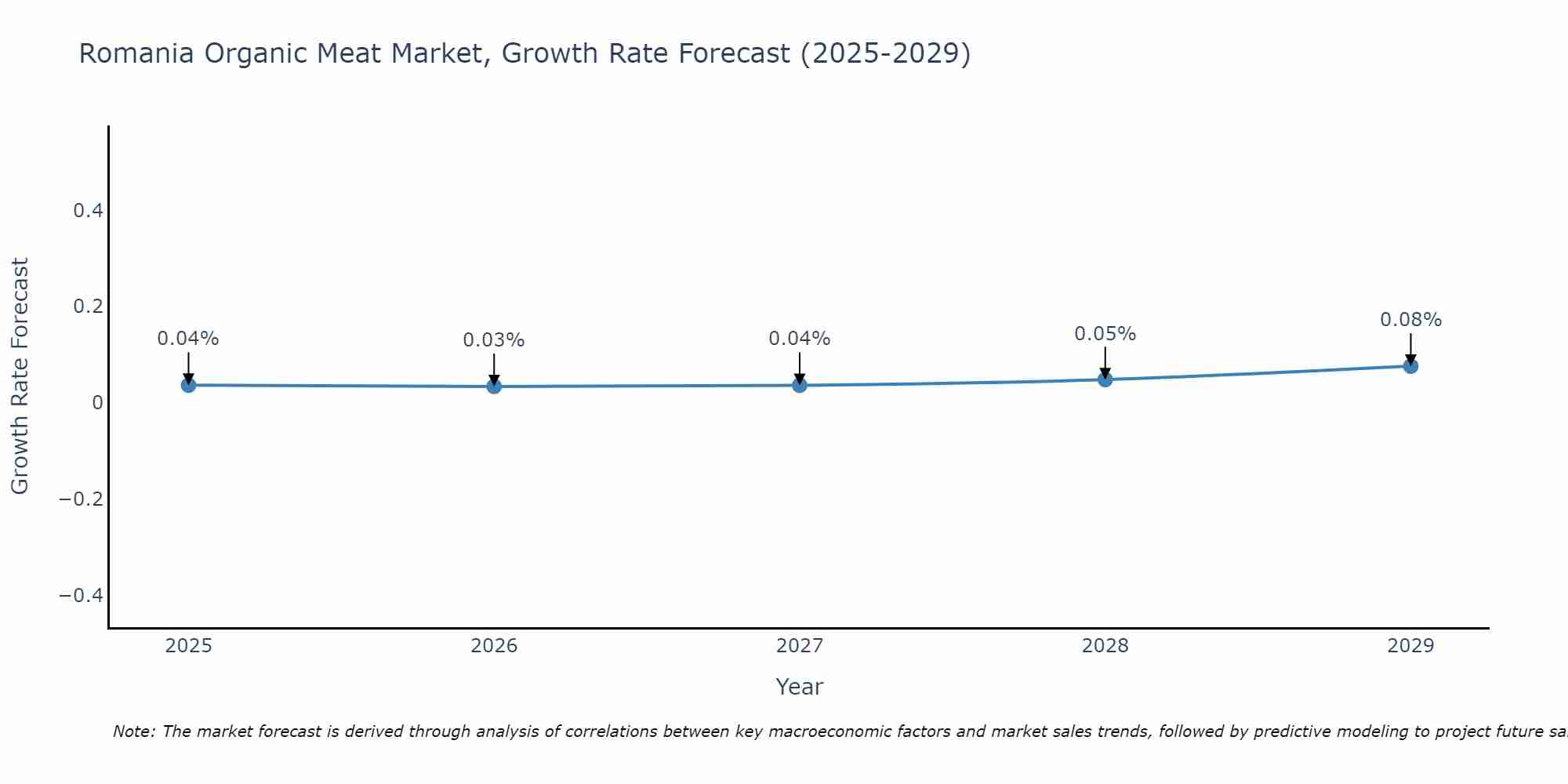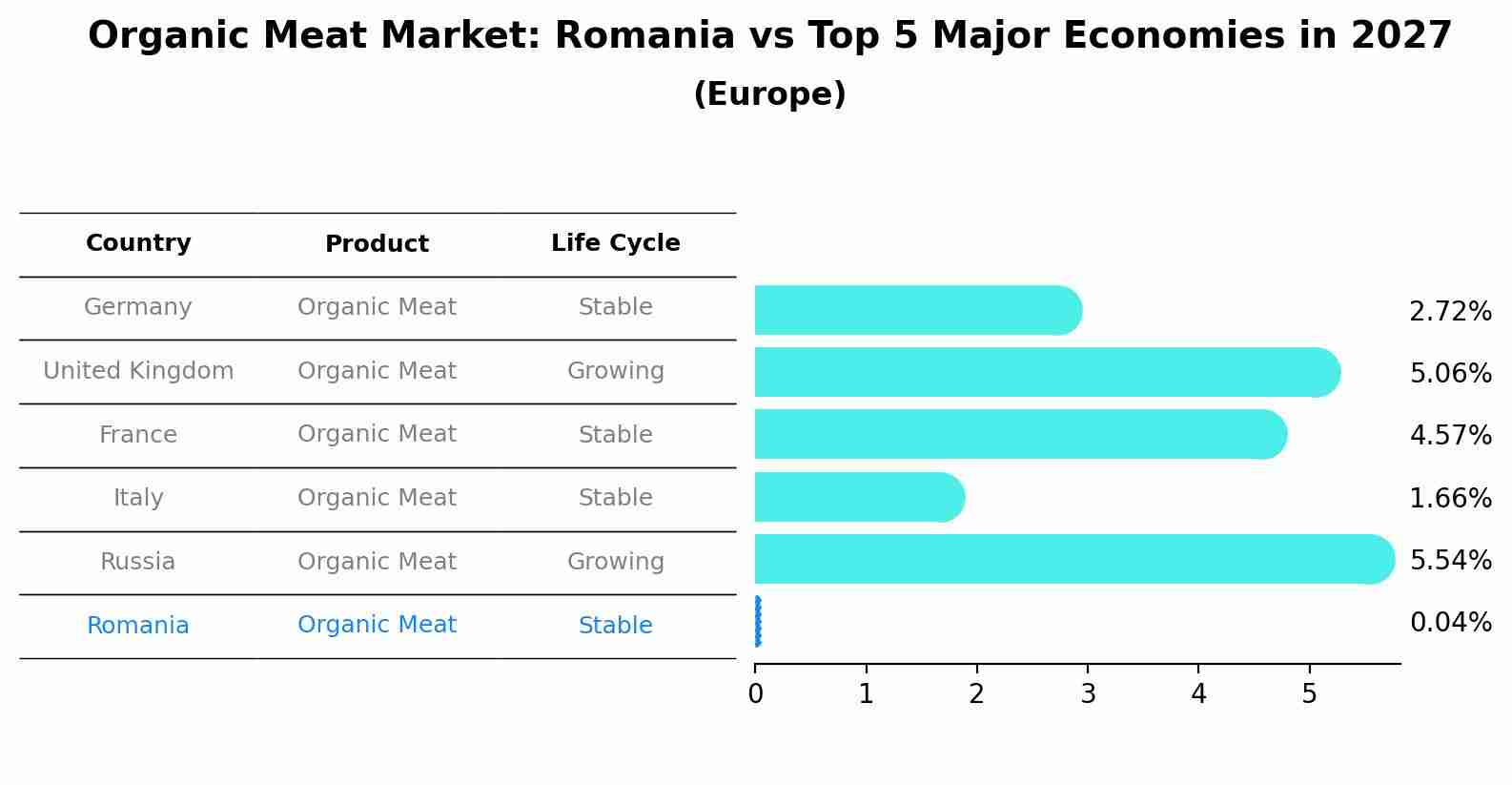Romania Organic Meat Market (2025-2031) Outlook | Revenue, Analysis, Industry, Growth, Share, Size, Trends, Companies, Value & Forecast
| Product Code: ETC383598 | Publication Date: Aug 2022 | Updated Date: Jul 2025 | Product Type: Market Research Report | |
| Publisher: 6Wresearch | Author: Shubham Deep | No. of Pages: 75 | No. of Figures: 35 | No. of Tables: 20 |
Romania Organic Meat Market Size Growth Rate
The Romania Organic Meat Market is projected to witness mixed growth rate patterns during 2025 to 2029. Commencing at 0.04% in 2025, growth builds up to 0.08% by 2029.

Organic Meat Market: Romania vs Top 5 Major Economies in 2027 (Europe)
Romania's Organic Meat market is anticipated to experience a stable growth rate of 0.04% by 2027, reflecting trends observed in the largest economy Germany, followed by United Kingdom, France, Italy and Russia.

Romania Organic Meat Market Synopsis
The Romania organic meat market is witnessing steady growth driven by increasing consumer awareness regarding the benefits of organic products. The demand for organic meat, sourced from animals raised in humane and environmentally sustainable conditions, is on the rise in Romania. Consumers are increasingly seeking out organic meat due to concerns about food safety, animal welfare, and environmental sustainability. Key players in the market are focusing on expanding their product offerings and distribution channels to cater to the growing demand. The market is characterized by a mix of domestic producers and international players, with a variety of organic meat products available including beef, pork, poultry, and lamb. Overall, the Romania organic meat market is poised for further growth as consumers continue to prioritize health, sustainability, and ethical food choices.
Romania Organic Meat Market Trends
In Romania, the organic meat market is experiencing a steady growth trend driven by increasing consumer awareness of the benefits of organic products. Demand for organic meat products, such as beef, pork, and poultry, is rising as consumers seek healthier and more sustainable food options. The market is also seeing a shift towards online retail channels for purchasing organic meat, providing convenience for consumers. Additionally, there is a growing preference for locally sourced organic meat products, reflecting a desire for transparency and supporting local farmers. With a focus on quality, sustainability, and animal welfare, the Romania organic meat market is expected to continue its upward trajectory as more consumers prioritize health and environmental concerns in their food choices.
Romania Organic Meat Market Challenges
In the Romania Organic Meat Market, several challenges are faced, including limited consumer awareness and understanding of the benefits of organic meat, leading to a relatively small market size. Additionally, there is a lack of standardized regulations and certifications for organic meat production, which can hinder the growth of the sector and create issues with product quality and authenticity. Supply chain inefficiencies and high production costs also pose challenges for organic meat producers in Romania, impacting their competitiveness in the market. Furthermore, the presence of conventional meat products at lower prices can make it difficult for organic meat to attract price-conscious consumers. Overcoming these challenges will require increased education and promotion efforts, as well as improved regulatory frameworks and cost-effective production methods in the Romania Organic Meat Market.
Romania Organic Meat Market Investment Opportunities
The Romania organic meat market offers promising investment opportunities due to the increasing consumer demand for organic, sustainably produced meat products. With a growing health-conscious population and a rising awareness of the environmental impact of conventional meat production, there is a significant market potential for organic meat in Romania. Investors can consider opportunities in organic meat production, processing, distribution, and retail. Collaborating with local farmers to develop organic farming practices or investing in state-of-the-art processing facilities could be viable options. Additionally, targeting niche markets such as organic charcuterie or specialty cuts can differentiate offerings in a competitive landscape. Overall, the Romania organic meat market presents a lucrative investment prospect for those looking to capitalize on the shift towards sustainable and healthier food choices.
Jordan Agar Market Government Policies
In Romania, government policies related to the organic meat market are primarily governed by the European Union regulations on organic farming, which set standards for the production and labeling of organic products. The Romanian government has implemented these regulations through the Ministry of Agriculture and Rural Development, which oversees the certification process for organic meat producers. In recent years, there has been a growing focus on supporting and promoting organic agriculture in Romania, with various incentives and subsidies available for organic meat producers to encourage sustainable farming practices. Additionally, the government has been working to improve traceability and transparency in the organic meat market to ensure consumer confidence in the quality and authenticity of organic products.
Romania Organic Meat Market Future Outlook
The future outlook for the Romania Organic Meat Market appears promising due to increasing consumer awareness and demand for healthier and sustainably-produced food products. The growing trend towards organic and natural food choices, driven by health and environmental concerns, is expected to drive the market growth. Additionally, the government`s initiatives to support organic farming and the rising disposable income levels among consumers are likely to further boost the market. With a focus on quality, transparency, and sustainability, organic meat producers in Romania are well-positioned to capitalize on these trends and expand their market share in the coming years. However, challenges such as higher production costs and limited availability of organic feed sources may impact the market`s growth trajectory. Overall, the Romania Organic Meat Market is expected to experience steady growth and offer opportunities for both domestic producers and international players looking to enter the market.
Key Highlights of the Report:
- Romania Organic Meat Market Outlook
- Market Size of Romania Organic Meat Market, 2024
- Forecast of Romania Organic Meat Market, 2031
- Historical Data and Forecast of Romania Organic Meat Revenues & Volume for the Period 2021 - 2031
- Romania Organic Meat Market Trend Evolution
- Romania Organic Meat Market Drivers and Challenges
- Romania Organic Meat Price Trends
- Romania Organic Meat Porter's Five Forces
- Romania Organic Meat Industry Life Cycle
- Historical Data and Forecast of Romania Organic Meat Market Revenues & Volume By Type for the Period 2021 - 2031
- Historical Data and Forecast of Romania Organic Meat Market Revenues & Volume By Poultry for the Period 2021 - 2031
- Historical Data and Forecast of Romania Organic Meat Market Revenues & Volume By Beef for the Period 2021 - 2031
- Historical Data and Forecast of Romania Organic Meat Market Revenues & Volume By Pork for the Period 2021 - 2031
- Historical Data and Forecast of Romania Organic Meat Market Revenues & Volume By Others for the Period 2021 - 2031
- Historical Data and Forecast of Romania Organic Meat Market Revenues & Volume By Application for the Period 2021 - 2031
- Historical Data and Forecast of Romania Organic Meat Market Revenues & Volume By Food Services for the Period 2021 - 2031
- Historical Data and Forecast of Romania Organic Meat Market Revenues & Volume By Retail for the Period 2021 - 2031
- Historical Data and Forecast of Romania Organic Meat Market Revenues & Volume By Distribution Channel for the Period 2021 - 2031
- Historical Data and Forecast of Romania Organic Meat Market Revenues & Volume By B2C for the Period 2021 - 2031
- Historical Data and Forecast of Romania Organic Meat Market Revenues & Volume By B2B for the Period 2021 - 2031
- Romania Organic Meat Import Export Trade Statistics
- Market Opportunity Assessment By Type
- Market Opportunity Assessment By Application
- Market Opportunity Assessment By Distribution Channel
- Romania Organic Meat Top Companies Market Share
- Romania Organic Meat Competitive Benchmarking By Technical and Operational Parameters
- Romania Organic Meat Company Profiles
- Romania Organic Meat Key Strategic Recommendations
Frequently Asked Questions About the Market Study (FAQs):
- Single User License$ 1,995
- Department License$ 2,400
- Site License$ 3,120
- Global License$ 3,795
Search
Thought Leadership and Analyst Meet
Our Clients
Related Reports
- Afghanistan Apparel Market (2026-2032) | Growth, Outlook, Industry, Segmentation, Forecast, Size, Companies, Trends, Value, Share, Analysis & Revenue
- Canada Oil and Gas Market (2026-2032) | Share, Segmentation, Value, Industry, Trends, Forecast, Analysis, Size & Revenue, Growth, Competitive Landscape, Outlook, Companies
- Germany Breakfast Food Market (2026-2032) | Industry, Share, Growth, Size, Companies, Value, Analysis, Revenue, Trends, Forecast & Outlook
- Australia Briquette Market (2025-2031) | Growth, Size, Revenue, Forecast, Analysis, Trends, Value, Share, Industry & Companies
- Vietnam System Integrator Market (2025-2031) | Size, Companies, Analysis, Industry, Value, Forecast, Growth, Trends, Revenue & Share
- ASEAN and Thailand Brain Health Supplements Market (2025-2031) | Strategy, Consumer Insights, Analysis, Investment Trends, Opportunities, Growth, Size, Share, Industry, Revenue, Segments, Value, Segmentation, Supply, Forecast, Restraints, Outlook, Competition, Drivers, Trends, Demand, Pricing Analysis, Competitive, Strategic Insights, Companies, Challenges
- ASEAN Bearings Market (2025-2031) | Strategy, Consumer Insights, Analysis, Investment Trends, Opportunities, Growth, Size, Share, Industry, Revenue, Segments, Value, Segmentation, Supply, Forecast, Restraints, Outlook, Competition, Drivers, Trends, Demand, Pricing Analysis, Competitive, Strategic Insights, Companies, Challenges
- Europe Flooring Market (2025-2031) | Outlook, Share, Industry, Trends, Forecast, Companies, Revenue, Size, Analysis, Growth & Value
- Saudi Arabia Manlift Market (2025-2031) | Outlook, Size, Growth, Trends, Companies, Industry, Revenue, Value, Share, Forecast & Analysis
- Uganda Excavator, Crane, and Wheel Loaders Market (2025-2031) | Strategy, Consumer Insights, Analysis, Investment Trends, Opportunities, Growth, Size, Share, Industry, Revenue, Segments, Value, Segmentation, Supply, Forecast, Restraints, Outlook, Competition, Drivers, Trends, Demand, Pricing Analysis, Competitive, Strategic Insights, Companies, Challenges
Industry Events and Analyst Meet
Whitepaper
- Middle East & Africa Commercial Security Market Click here to view more.
- Middle East & Africa Fire Safety Systems & Equipment Market Click here to view more.
- GCC Drone Market Click here to view more.
- Middle East Lighting Fixture Market Click here to view more.
- GCC Physical & Perimeter Security Market Click here to view more.
6WResearch In News
- Doha a strategic location for EV manufacturing hub: IPA Qatar
- Demand for luxury TVs surging in the GCC, says Samsung
- Empowering Growth: The Thriving Journey of Bangladesh’s Cable Industry
- Demand for luxury TVs surging in the GCC, says Samsung
- Video call with a traditional healer? Once unthinkable, it’s now common in South Africa
- Intelligent Buildings To Smooth GCC’s Path To Net Zero


















